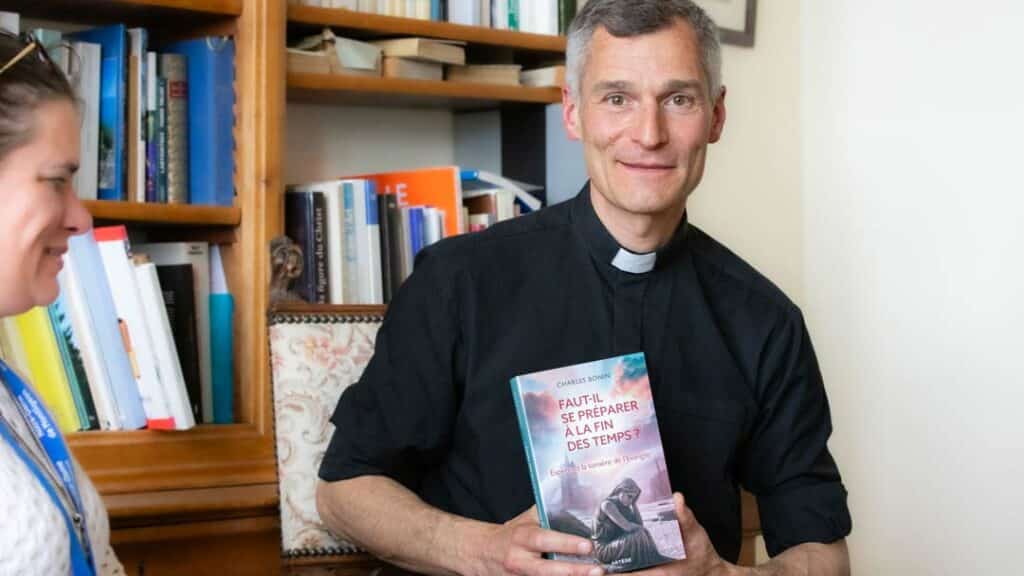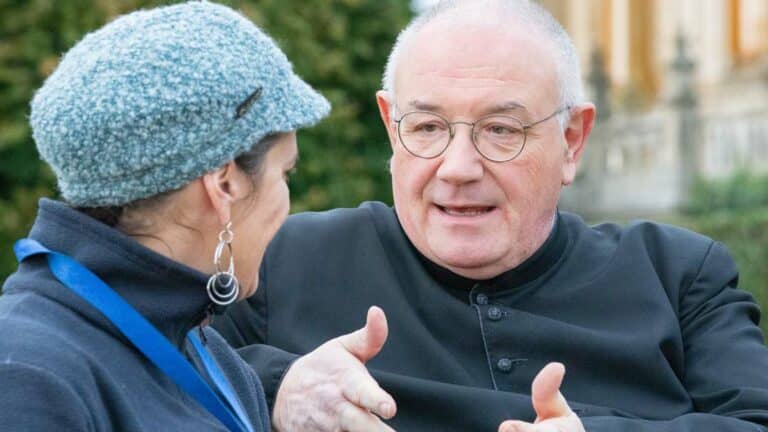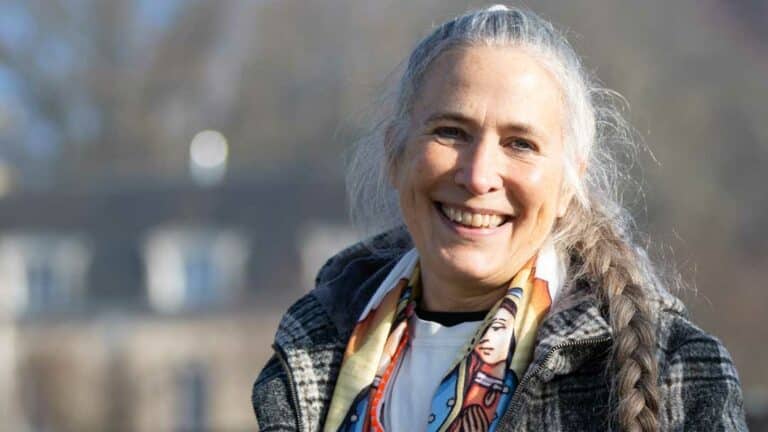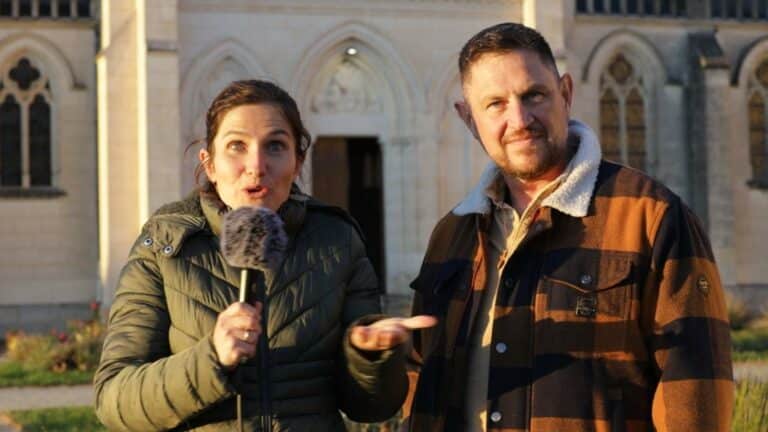Should we get prepared for the end of times? Father Charles Bonin, parish priest and dean of the diocese of Grenoble, answers this question in the light of the Gospel and the Catechism of the Catholic Church. In this interview at the Notre-Dame de Montligeon shrine, he discusses Christian hope in the face of trials, the mystery of iniquity, and the message of the Cross.
An interview by Amélie Le Bars with Father Charles Bonin, priest and dean in the diocese of Grenoble, author of Faut-il se préparer à la fin des temps ? (Artège, 2025).
What the Christians hope in relation to the end of times
“The end of times? From a Christian perspective, you need to understand that ‘the end’ is not just a term, it is primarily a goal, the ultimate purpose of life“, explains Father Charles Bonin, parish priest and dean in the diocese of Grenoble and author of Faut-il se préparer à la fin des temps (Artège, 2025). He distinguishes between the individual end, marked by the death of each individual, and the collective end, which opens the way to the parousia: the glorious advent of Christ at the end of history.
“Expecting the end of times is not a passive attitude but something to be actively watched,“ he asserts. “Every time we pray the Lord’s Prayer, saying ‘Thy kingdom come’, we are expressing the desire for Christ to come and reign not only in our lives today, but also in the world. This dual tension drives the entire Christian life.“
Father Bonin quotes the Catechism of the Catholic Church (no. 677), where a “final trial” is announced for the Church, marked by a great destabilization of faith ultimately followed by a religious imposture – that of the Antichrist, presented as a pseudo-messianism in which man glorifies himself in place of God. “The Church will know the glory of the Kingdom only by passing through her Passover, in the image of her Lord,“ he reminds us.
The mystery of iniquity and religious imposture
The passage from the Catechism quoted by Father Bonin evokes the mystery of iniquity, which, in his own words is “somewhat mysterious“, heralding the supreme religious imposture and subversion of norms at the end of time. This mystery, already in the making in history, will culminate in a generalized apostasy in which the love of many will grow cold as they allow themselves to be seduced by false responses to human expectations.
What the Catechism describes as an ‘apparent solution to mankind’s problems’ comes at the price of a demonic work aimed at destroying the image of the Triune God in man. The ultimate temptation is to glorify man instead of God, in a form of self-sufficiency that denies the incarnation of Christ. This eschatological reading is not intended to frighten us, but to encourage us to be vigilant, or, as Father Bonin puts it: “To wait for Him proactively, preparing to stand before the Lord, is already to guard oneself against evil.“
An active watch fueled by prayer and faith
Getting prepared for this end is not to anticipate a catastrophe, but to live in the light of the Gospel. “The first piece of advice I would give is to be vigilant. The Christian is a watchman,“ insists Father Bonin. Our whole life is a preparation for the encounter with Christ.
Watchfulness is nourished by prayer, as testified by the monastic tradition. “Religious life is already an anticipation of the Kingdom,“ he explains. Consecrated men and women are constantly on the lookout for eternity. The practice of the sacraments, especially the Eucharist, gradually prepares us for the wedding feast of the eternal covenant.
“Christ did not abolish suffering, he assumed and transcended it.“
There is another path however, one that is often less travelled: the way of martyrdom, that is, of witnessing to greater hope and offering suffering for the sake of the Kingdom. “Christ didn’t do away with suffering, he took it on and transcended it,“ he declares. By uniting our crosses with those of the Lord, we enter into the mystery of redemption. By being part of this dynamics can all suffering become a path to salvation.
Last but not least, every christened person is a prophet, that is to say, he or she is called to denounce evil and speak good in word and deed. Evangelization and works of fraternal charity contribute to the advent of the Kingdom today, in concrete terms. The Church and Christians are invited to fully assume this political role in the world of today, which thirsts for the freedom and peace that Christ offers to everyone.
When hope collapses, let’s turn to the Cross
What do we do when suffering becomes unbearable and hope seems to elude us? For Father Bonin, a simple but radical move can be the way forward: “Let’s turn to the Cross“, he suggests. He refers to the biblical episode when Moses erected a bronze serpent in the desert. This sign of salvation prefigures the Cross of Christ: “When he is lifted up from the earth, he will draw all men to himself“.
To look at the Cross is to adopt a fresh perspective. Pain should not be denied but seen through the eyes of Christ, who lifts us up. “It’s about breaking out of our confinement, out of this purely human vision of suffering,“ explains Father Bonin. In this way, the Cross becomes the path of life.
Father Bonin admits this path is neither simple nor immediately consoling. But it allows us to step into a deeper meaning of existence: “We need to understand that an act of redemption takes place through suffering“, he says.
Living Passover every day
Such is the meaning of Passover: a passage. “Our life is a passage, a transition, an exodus from death to life“, he recalls. As opposed to the human conception where death is seen as an end, the Gospel asserts the contrary. Father Bonin quotes St. Theresa of the Child Jesus: “I don’t die, I enter life“.
Those words summarize the whole Christian hope. We are not called to sink into nothingness but to enter eternal life. Our struggle, our suffering, our wakes find their meaning in this certainty: we are walking towards fulfillment, towards an encounter – the accomplishment of the covenant.
United in good as well as in evil
Father Bonin stresses that the message of the Cross is not encapsulated in a defeat but in a turnaround. To enlighten this idea, he uses an unusual image : that of martial arts. “The strength of the opponent is used to turn them about. That’s exactly the message of the Cross! On the Cross, Christ does ‘karate’, turning the strength of the opponent about. He does not respond to evil by evil, as this would only increase evil. He disarms them by opposing love and forgiveness.“ Such strategy, humorously described by Father Bonin as “spiritual aikido”, is the core of Christian hopefulness: you don’t overpower the enemy by strength but you turn their violence against themselves by gentleness and faithfulness.
This is also how true solidarity is built within the Church. Christ’s victory over evil becomes a source of unity and hope for all believers, who are encouraged to follow the same path in their own struggles.
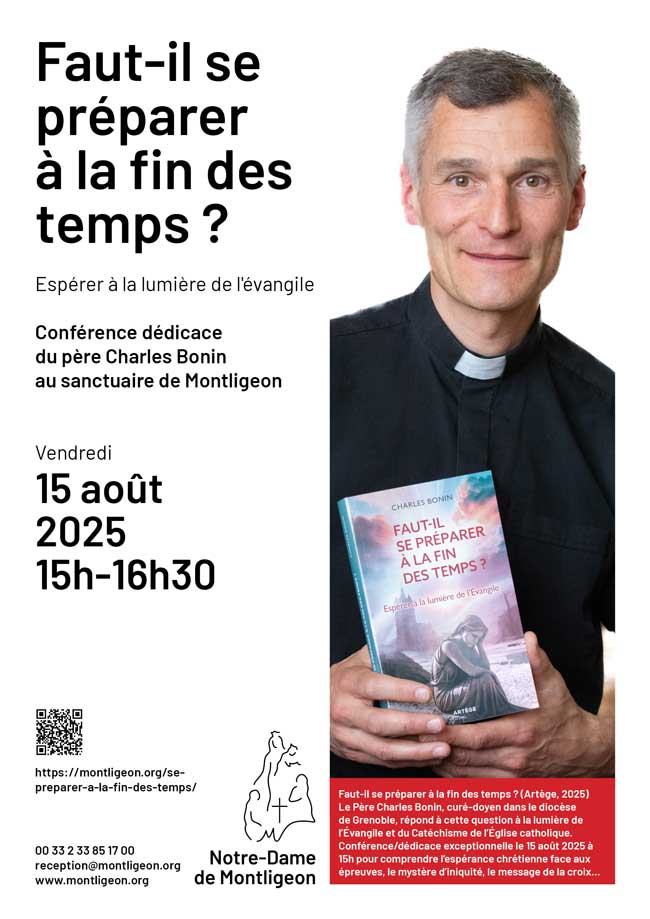
We do not carry ourselves, He carries us, through his Cross and his Resurrection
Father Bonin does not think that such expectation should be lived in fear but in joyous hopefulness. He encourages us to experience this proactive attitude on a daily basis through faithfulness in prayer, offering our suffering and taking care of others. The Christian is expected to stand alert, actively engaged in charity, knowing that the Lord comes to meet us all the time.
By uniting ourselves to the Cross of Christ in the gift of self can we fully experience this passage. In the light of the Resurrection, fears are put in their rightful place, and faith can flourish in peace. Those who live like this are already blessed.
Conference / book signing session
Friday
August 15
2025 at 3 p.m.
At the shop of the Shrine

